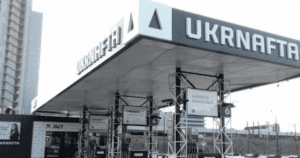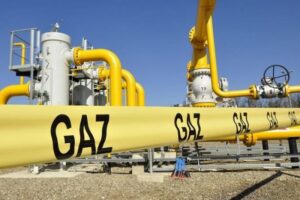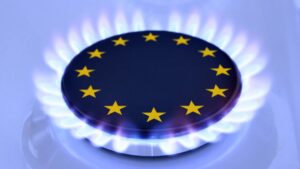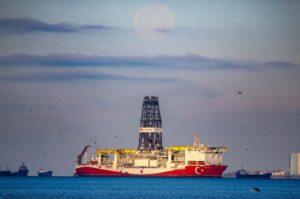
PJSC “Ukrnafta” in November-December 2022 has resumed sales of natural gas at the exchange auctions.
“In November-December, the company sold 17.1 million cubic meters of blue fuel on the platform of the Ukrainian Energy Exchange,” the company said in a press release on Thursday.
Besides, “Ukrnafta” also intensified its work at the market of natural gas supplies to the final consumer, the PJSC noted.
As Ukrnafta director Sergii Koretsii (who took over from Oleg Gez on November 10, 2022) said in an interview with Interfax-Ukraine in late December 2022, the company plans to sell its own gas reserves in the underground storage facilities in the total volume of over 500 mln cubic meters at the exchange and/or through direct contracts.
According to him, Ukrnafta also plans to actively enter the market of natural gas supplies to end consumers.
“Just for the sake of understanding, the company used to have only five customers under direct contracts. Now we plan to become a reliable long-term partner both for large industrial enterprises and for businesses that need small volumes,” said Ukrnafta’s director.
As reported, Ukrnafta in 2021 reduced oil and condensate production by 0.1% compared to 2020 – to 1.499 million tons, gas – by 0.9% – to 1.117 billion cubic meters, but increased the production of liquefied gas by 1% (1.2 thousand tons) – to 117.7 thousand tons.
On November 5, 2022, the Supreme Commander in Chief decided to confiscate Ukrnafta shares (except for the controlling interest in Naftohaz Ukrainy) as state property during the martial law. Before the seizure, the structures of Ihor Kolomoyskyy and Hennadiy Boholyubov owned about 42% of Ukrnafta shares.
“Ukrnafta owns 85 special permits for production of hydrocarbons. On its balance sheet there are 1809 oil and 153 gas wells. The company owns 537 gas stations, of which 449 were in operation at the end of December 2022. The rest were either damaged as a result of military operations or are located in the temporarily occupied territories.

The IMF staff’s main scenario under the Monitoring Program with the Board of Directors (PMB) suggests that Ukraine will need to purchase 5 billion cubic meters of gas in 2023, spread evenly over 12 months.
According to the schedule presented in the documents, without imports, Ukraine will leave this heating season with reserves of 6 billion cubic meters and by the next heating season will only be able to increase them to 8.5 billion cubic meters, which will cause their fall to 6 billion cubic meters by the beginning of 2024.
At the same time, taking into account imports, gas reserves at the end of this heating season will be only slightly below 9 billion cubic meters, and by the next will increase to almost 14 billion cubic meters, which is only about 0.5 billion cubic meters less than at the beginning of this season.
“To help Naftogaz meet the associated increase in financing needs, the government is already providing budget support to the company through an implicit subsidy in the form of lost revenues from rent payments for gas, which is estimated at about UAH 145 billion ($3.5 billion) for 2023,” the materials on the Fund’s website to the PMB indicate.
At the same time, IMF experts suggest that more support is likely to be needed, including as compensation for utility service obligations due to the fixing of the retail gas price at 7.4 UAH per cubic meter – well below the import parity price.
They added that the Heating Utility Company (HUC) and Gas Transmission System Operator (GTSO), whose liquidity suffers due to lower transit fees and low capacity usage, may also need support.
“In general, according to staff estimates, up to UAH 150 billion ($3.6 billion) in the form of additional financial support to Naftogaz, UGTSU and TKE may be required in 2023,” the IMF experts said.

The Northern Mining and Processing Plant (SevGOK, Krivoy Rog, Dnipropetrovsk Region), which is part of Metinvest Group, intends to implement a technology to replace natural gas with solid biofuel.
According to the materials available to Interfax-Ukraine agency, the planned activity is “implementation of the technology of natural gas substitution by solid biofuel (chopped sunflower husk), installation of complex facilities and equipment, which will be connected to Lurgi-552 A, B roasting machines without any essential changes in the existing equipment”.
It is specified that the new construction of the complex of facilities for biofuel supply is expected to be carried out at the industrial site of SevGokhoz.
The timing of the project and the amount of its costs are not disclosed.
Northern Mining Company is one of the largest mining companies in Europe, which specializes in the production of iron ore concentrate with iron content of 65.8% and pellets with iron content of 63%. Its production capacity exceeds 13 mln tonnes of concentrate and approximately 8 mln tonnes of pellets a year. The enterprise includes the Pervomaysky and Annovsky open pits, two beneficiation plants, two pelletizing shops and auxiliary infrastructure.
SevGOK is part of Metinvest group, whose major shareholders are System Capital Management PJSC (SCM, Donetsk) (71.24%) and Smart Holding group of companies (23.76%).
The management company of the Metinvest group is Metinvest Holding LLC.

Natural gas supply to Ukraine from EU countries in November 2022 amounted to 228 mln. cubic meters, 27.7% less than in October (315.4 mln. cubic meters), operational data of GTS Operator of Ukraine show.
In particular, the supply of gas to the “customs warehouse” UGS in November made 191.1 million cubic meters against 261.9 million cubic meters in October.
In November, Romania with a modest volume of 0.3 million cubic meters was added to the gas supply to the Ukrainian GTS from Poland, Slovakia and Hungary. At the same time, in the morning of December 2, 8.7 million cubic meters of the total volume was received at the entrance from Romania out of a total of 18.1 million cubic meters. Romanian volumes bypassed the “customs warehouse”.
According to the analytical publication ICIS, Moldova imports gas from Romania through the Trans-Balkan pipeline. Volumes delivered through the Greece-Bulgaria interconnector (IGB) were physically sent north to Moldova via the Trans-Balkan line via Romania and Ukraine.
Once the volumes enter Moldova through the southern border crossing of Causeni, they can be subtracted from the volumes entering Moldova from Ukraine through the Grebeninki border crossing in the north, a regional source told ICIS.
“It took almost six years to unblock the network in the region and start physical gas supplies from alternative directions,” former UGTSU head Sergei Makogon said in a comment to ICIS.
As reported, in September 2022, from the territory of Poland, Slovakia and Hungary to Ukraine received 29.4 million cubic meters (TC – 17.4 million cubic meters), August – 142.1 million cubic meters (120.7 million cubic meters), July – 119 million cubic meters (82.6 million cubic meters). The Trans-Balkan Gas Pipeline is located in the northern part of the Russian Federation, in July – 119 million cubic meters (82.6 million cubic meters), June – 46.1 million cubic meters (6.6 million cubic meters), May – 24 million cubic meters (4.9 million cubic meters), April – 3.2 million cubic meters (3.2 million cubic meters), March – 282.3 million cubic meters (10 million cubic meters), February – 349.7 million cubic meters (11 million cubic meters), January – 47 million cubic meters (0.0 million cubic meters).
The Trans-Balkan pipeline is a trunk gas pipeline crossing the territory of Ukraine, Moldova, Romania, Bulgaria and Turkey.

Ankara intends to produce oil and gas in the waters of Libya within the framework of the energy agreement concluded by Turkey with this country, Turkish President Recep Tayyip Erdogan said.
“After the agreement on hydrocarbons signed by us with Libya, we will cooperate in a new area – in the extraction of oil and other resources from the Libyan continental shelf,” Bloomberg quotes him as saying.
Erdogan also announced plans to double the capacity of the Trans-Anatolian gas pipeline (TANAP), which runs from Azerbaijan through Georgia and Turkey to Greece.
Bloomberg recalls that Ankara and the administration of Abdel Hamid al-Dbeiba concluded this agreement last week: he was supposed to leave the post of prime minister after December 25, 2021, but did not do this, citing the disruption of the presidential elections in Libya. As a result, the Prime Minister of another Libyan government, Fathi Bashaga, rejected this agreement, emphasizing that al-Dbeiba does not have the authority to conclude agreements with foreign states.
At the same time, the current agreements are based on the 2019 agreement that Ankara concluded with the previous internationally recognized government of Libya, and to which Turkey provided military assistance in the confrontation with the forces of Marshal Khalifa Haftar.
In turn, the EU said that the new agreement does not comply with the UN Convention on the Law of the Sea and violates the interests of third parties. Also, Greece, Cyprus and Egypt regard the agreement as an attempt by Turkey to dominate the waters of the region.
In Libya, for a long time, there were two bodies of executive power in parallel: the Government of National Accord in Tripoli, in the west of the country, and an interim cabinet in the east of the country, supported by the army of Marshal Khalifa Haftar. According to Western media, Haftar’s forces were supported by Russia, France, Saudi Arabia, the United Arab Emirates, Egypt, Greece and Cyprus. On the side of the government in Tripoli, in turn, were Turkey, Qatar and Italy.
In October 2021, in Geneva, representatives of the warring parties signed an agreement on a permanent ceasefire. The presidential elections in Libya, the first after the overthrow and assassination of Muammar Gaddafi, were scheduled for December 24, 2021, but in the end the vote did not take place. This was due to controversy surrounding the electoral law.
GAS, OIL, PRODUCTION, TURKEY

Azerbaijani gas supplies to Europe will increase by 40% to 11.5 billion cubic meters in 2022, Azerbaijani President Ilham Aliyev said.
“In 2022, our export will reach 22 billion cubic meters, of which 11.5 billion cubic meters will be supplied to consumers in Europe. In 2021, 8.2 billion cubic meters was supplied to Europe. This means a 40% increase in the supplies in 2022,” Aliyev said at the ceremony for putting into commercial operation the Gas Interconnector Greece-Bulgaria (IGB) in Sofia on Saturday.
In accordance with the agreements with the European Union, Azerbaijan plans to at least double its gas export to Europe by 2027.
For that purpose, Baku has begun consultations with its partners on the issue of expansion of the Trans-Anatolian Natural Gas Pipeline (TANAP) to 32 billion cubic meters of gas a year and the Trans Adriatic Pipeline (TAP) to 20 billion cubic meters of gas a year, Aliyev said.
“We have already begun consultations with our partners on the expansion of the TANAP from 16 billion cubic meters to 32 billion cubic meters and the TAP from 10 billion cubic meters to 20 billion cubic meters. Because without it it will be difficult to ensure additional supplies,” the president said.
Aliyev said Azerbaijan has the capabilities to increase the gas export volumes by starting extraction at some other gas deposits.